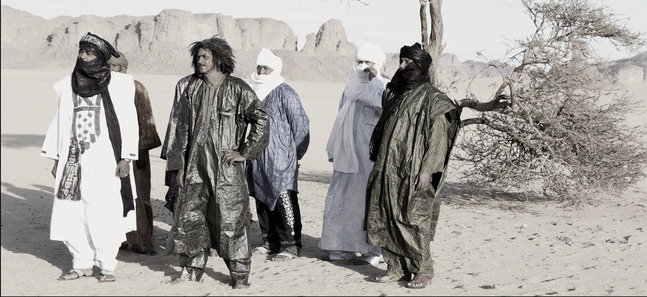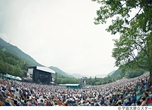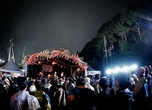Tinariwen: the interview
The legends of the Sahara head to Fuji Rock

Posted: Fri Jul 22 2011
They probably aren’t at the top of your wish list for this year’s Fuji Rock. But maybe they should be. They’ve already become the band to namecheck (Robert Plant: ‘Listening to Tinariwen is like dropping a bucket into a deep well’; Bono: ‘This kind of music is like a breath that I can feel’; Thom Yorke: ‘I copied their style’), and industry bods are touting them as one of modern music’s most influential outfits. Richly ironic, of course. It’s said that in their music you can hear scales and rhythms that may have inspired Robert Johnson’s delta blues. And their story – well, that’s as old as the desert itself.
It begins in the Sahara. Africa won its independence in the early 1960s, but for the nomadic Tuareg people of the northern desert region, it brought with it terrible hardships. Unable to reconcile themselves with the new Malian government, they found themselves persecuted and violently suppressed. It’s a memory that haunts the Tuareg still, and provides a catalyst to the Tinariwen tale.
‘When I was three or four years old, the Malian army came to take my father,’ says Ibrahim Ag Alhabib, the band’s founding member and lead singer. Amazingly, he’s explaining his earliest childhood memory. ‘They killed all our animals around the encampment, but my family didn’t want to tell me what happened to my father. It was from the other children that I learned of the tragedy. From that moment, I was angry.’
Growing up in the itinerant refugee camps, Ibrahim, like mini-rebels the world over, found respite from his anger in music. ‘I was totally isolated during my childhood,’ he recalls. ‘Only on a few occasions could I listen to the radio or watch TV, not sufficiently enough to know who was playing.’ His solace came largely from traditional Tuareg music, though he specifically remembers seeing a guitar being played in an anonymous cowboy movie (‘from that moment, I was looking for one!’). The story goes that the young Ibrahim promptly ran outside and built a guitar out of a tin can and some brake cable. Whether it’s true or not, it’s fast becoming part of his legend. What he does recall vividly is that the ability to make music helped keep the refugees buoyant. ‘Our situation was lamentable. In exile we were wandering, not knowing where to go or what we could do. Playing together gave us motivation and enthusiasm to explain the reality of our people.’
Like all good rock’n’roll stories, the boy eventually got the guitar (bought from a fellow in one of the refugee camps Ibrahim found himself in), and, by the late 1970s, he’d fallen in with a gang of similarly minded Tuareg music junkies, playing an improvised fusion of Elvis, chaabi protest songs, Dire Straits and Algerian rai at weddings and parties. ‘Our interaction was done with a lot of discretion,’ he recalls, ‘but the music... the lyrics that speak of the nomadic life of the Tamashek (Tuareg) people gave us the courage to face the reality.’
By 1980, the reality appeared to have taken a turn for the easier. Drifting east into Libya, Tinariwen (literally, ‘The Desert Boys’, as they were now known) found themselves lured by Colonel Gaddafi’s new desert training camps, set up ostensibly to give Tuareg youth hope that they may one day be able to win their freedom back through force. In truth, the Libyan leader sought only to strengthen his position as a regional power, and as the depressing truth dawned, Tinariwen’s desert blues gave voice to the Tuareg’s disillusion. ‘Our people found an identity in this modern band,’ he recalls. The music spread just as fast as the scratchy, bootleg tapes could be copied. In the early ’90s the group travelled to France to perform, and by January 2001, Tinariwen had become the founding fathers of Mali’s Festival in the Desert, still going strong 10 years later.
Meanwhile, their reputation continues to grow across the Western world, thanks in part to organisations like Womad. We wonder how Tinariwen’s success has helped young Tuareg musicians back in their own country. ‘The world is beginning to be curious about our style,’ says Ibrahim, ‘so the doors are open for the young generation to develop.’ He’s keen to show, too, that their intent is always to give something back: ‘The shows we do in the desert, and the rehearsals for our album – these are good moments that help to give jobs around each activity.’
Before we depart, we’re keen to tackle that blues question. No less an authority than Carlos Santana has said that by performing Tuareg traditional folk music, Tinariwen represents the sound that gave birth to the genre (‘Muddy Waters, BB King, Little Walter... this is where it all comes from... [Tinariwen] are the originators’). It’s quite a mantle to bear, so how does Ibrahim feel about carrying it? ‘The origins are different,’ he muses, ‘but the notes and the blue colours are the same.’
‘We are singing about life,’ he concludes; ‘the great game of poesy. We are speaking of the truth from and at our eyes... the mode of nomadic life from the Tamashek people we love.’ Unless we’re much mistaken, it sounds like them ol’ walkin’ blues again.
Tinariwen play on Fuji Rock Festival's Field of Heaven stage on July 31. Their new album, Tassili, is due to be released in early September
Tweets
- About Us |
- Work for Time Out |
- Send us info |
- Advertising |
- Mobile edition |
- Terms & Conditions |
- Privacy policy |
- Contact Us
Copyright © 2014 Time Out Tokyo














Add your comment